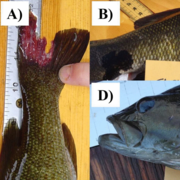Water Quality and Ecology
Water Quality and Ecology
PFAS chemicals detected in many rivers and streams across Pennsylvania
USGS-led study also analyzed potential contaminant sources
USGS-led study also analyzed potential contaminant sources
First-of-its-Kind Survey of PFAS in Pennsylvania Surface Waters
In collaboration with the Pennsylvania Department of Environmental Protection
In collaboration with the Pennsylvania Department of Environmental Protection
Pennsylvania and the Chesapeake Bay Watershed
USGS research efforts focus on emerging contaminants and stressors that affect human and aquatic life
USGS research efforts focus on emerging contaminants and stressors that affect human and aquatic life
Pennsylvania Surface Water-Quality Monitoring Network (WQN)
In cooperation with the Pennsylvania Department of Environmental Protection Bureau of Clean Water
In cooperation with the Pennsylvania Department of Environmental Protection Bureau of Clean Water
Round Goby in Pennsylvania Waters
Round gobies are now the dominant benthic fish in many of the tributary streams of Lake Erie
Round gobies are now the dominant benthic fish in many of the tributary streams of Lake Erie
Pennsylvania Groundwater Quality Monitoring Network
USGS, in cooperation with the Pennsylvania Department of Environmental Protection, monitors 28 wells throughout the Commonwealth
USGS, in cooperation with the Pennsylvania Department of Environmental Protection, monitors 28 wells throughout the Commonwealth
Water quality or ecology science for Pennsylvania, or conducted by center staff.
Filter Total Items: 32
A regional assessment of fish health in the Chesapeake Bay watershed
Fish diseases in freshwater ecosystems pose significant ecological and socioeconomic challenges; yet, monitoring them in wild populations is complex due to interactions between pathogens, hosts, and environmental conditions. External DELT (deformity, erosion, lesion, tumor, and parasite) data (fig. 1) provide a rapid and broad measure of fish health but are a relatively coarse indicator that...
Three Rivers Region Water Quality Monitoring with Allegheny County Sanitary Authority
USGS, in cooperation with the Allegheny County Sanitary Authority (ALCOSAN), is monitoring water quality changes related to wastewater infrastructure improvements in the Three Rivers region in Pittsburgh, Pennsylvania.
Shale Gas and Water Resources in Pennsylvania
USGS and partner scientists are investigating water availability, use, quality, and ecology associated with development of shale-gas energy resources in Pennsylvania.
Pennsylvania and the Chesapeake Bay Watershed
USGS provides monitoring, analysis, modeling and research on streams and water quality to better understand the fate and transport of nutrients and sediment to the Susquehanna and other rivers, and their tributaries, and eventually to the Chesapeake Bay. Additional research focuses on emerging contaminants and other stressors that effect human and aquatic life in the watershed and estuary.
York County Sediment and Nutrient Monitoring
Since 2019, the USGS Pennsylvania Water Science Center has been cooperating with York County, Pennsylvania to implement in-stream monitoring to produce surrogate regression equations to compute, in real time, the concentration and load of total nitrogen, total phosphorus, and suspended sediment for 6 major watersheds in York County, Pennsylvania. This partnership provides the York County Planning...
Mine Drainage and Water Quality Research
USGS conducts research on geochemical and hydrological processes that control water quality, including the sources, transport, and attenuation of metals and nutrients in undisturbed and mining-impacted watersheds and aquifers. Results apply to scientific and regulatory programs for the prevention and remediation of aquatic contamination.
Pennsylvania Surface-Water Quality Monitoring Network
Pennsylvania’s Statewide Surface-Water Quality Monitoring Network (WQN) currently consists of 124 sites that are sampled between 6 and 20 times a year. Chemical analysis includes nutrient, major ions, and selected metals. Pesticide sampling is conducted twice a year at 5 locations. Biological sampling for benthic macroinvertebrates is conducted annually at 80 sites. The WQN was established to...
Hydrologic and Water Quality Studies of PFAS in Pennsylvania
USGS is working with federal, state, and local partners to monitor and evaluate perfluoroalkyl and polyfluoroalkyl substances (PFAS) in Pennsylvania's groundwater and surface waters.
Susquehanna River Story — What does the science say about water quality?
The wide and majestic Susquehanna River is one of the oldest rivers in the world and provides water for over 4 million people. Despite its beauty, the Susquehanna River and the Chesapeake Bay downstream has been facing the detrimental effects of excess nutrients (nitrogen and phosphorus).
Susquehanna River and Basin
In Pennsylvania, the USGS's water-resources roots date back to the late 1800's, with the initiation of streamflow gaging on the Susquehanna and Delaware Rivers and assessments of groundwater resources near Philadelphia. The USGS Pennsylvania Water Science Center continues to provide scientific information about the water resources of the Susquehanna River Basin, in cooperation with regional and...
Chester County, Pennsylvania
USGS has had a cooperative program with Chester County, Pennsylvania, to measure and describe water resources since 1969. Cooperation has been primarily with the Chester County Water Resources Authority, with participation from the Chester County Health Department. This partnership provides Chester County with scientific information for water-resources management.
Pesticides in Pennsylvania Groundwaters
USGS annually samples domestic groundwater wells to characterize pesticides, nutrients, and radon in agricultural areas, in cooperation with the Pennsylvania Department of Agriculture. Beginning in 2021, samples for major ions, trace elements, bacteria, and isotopes will also be collected. A subset of wells will be sampled for per- and polyfluoroalkyl substances (PFAS), emerging industrial...













